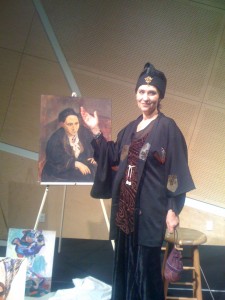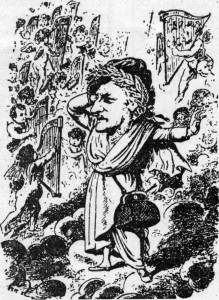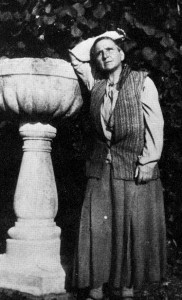The “Summer of Stein” in San Francisco coincided with the “Summer of the Ring.” Gertrude Stein and Richard Wagner are certainly odd bed-fellows and yet, there they were, one of them at the museums with two epochal shows(see my previous posts), the other at the opera house with the sixth-ever complete Cycle of Wagner’s Der Ring des Nibelungen at San Francisco Opera, heating up the atmosphere with equal excitement. (You can read my Ring review at the magazine Scene4. Two geniuses who have a few things in common, one could say: a monumental ego and a monumental oeuvre; a provocative sexuality running through their work – lesbian for Stein and somewhat “queer” for Wagner; a gift for attracting controversy; ambivalence, in Stein’s case, about her assimilated, upper-class Jewishness, and hysterical antisemitism in Wagner’s. Wagner’s antisemitism wasn’t taken seriously by his contemporaries, Laurence Dreyfus reminds us in his elegant new study, Wagner and the Erotic Impulse (Harvard University Press). Wagner’s tirades were considered ridiculous even by the likes of Theodor Herzl and Max Nordau, the founders of Zionism. With his effeminate passions for silk and lace (he wore pink satin underpants in order to compose), his heated romances with King Ludwig of Bavaria and other men, and the immoral and “degenerate” characters of his operas, Wagner was paradoxically seen as the epitome of what was considered “Jewish” by many of his contemporaries.
And Stein? Most people have been wondering about her way of dressing, too, starting with Hemingway who told us that his wife tried “not to stare at the strange, steerage clothes Miss Stein wore…” And more and more people do wonder about her relationship to her own Jewishness. The exhibition Seeing Gertrude Stein: Five Stories at the Contemporary Jewish Museum (CJM) raises the question how she and Alice, two American Jews and lesbians, survived in Nazi-occupied France, and how their collection of “degenerate art” survived as well?
The questions of Stein’s Jewishness are turning urgent. They recently overshadowed the charming performance at the CJM, Laura Sheppard’s “Paris Portraits: Stories of Picasso, Matisse, Gertrude Stein, and Their Circle.”

Sheppard did a staged reading from a little book of the same title that came out in time for the Summer of Stein, penned by a youth friend of Alice B. Toklas, critic and writer Harriet Lane Levy, who moved from San Francisco to Paris and met Gertrude and the other Steins together with Alice, in 1907. Her memoir is not exactly brilliant (although there are some amusing and spicy andecdotes). We are miles away from The Autobiography of Aice B. Toklas, but in Sheppards graceful peformance the text shone.
The ensuing panel discussion, however, did not seem interested in “Paris Portraits.” Panel member Fred Rosenbaum, whose book Cosmopolitans: A Social and Cultural History of the Jews of the San Francisco Bay Area also came out just in time, zoomed in on Stein and the Jewish question. He expressed such worry about Stein’s alleged allegiance with the French fascists that alarm descended over the audience. Gertrude Stein with fascist leanings! The room was packed, and people listened with shock and awe to Rosenshine’s indignant report about Stein recommending Hitler for the Peace Nobel Prize! She even wrote to the Nobel Committee, in 1938, to make the case for Hitler!
Yours truly had to jump to the public defense of Gertrude Stein who wasn’t there to defend herself. Expressing gratitude for the fact that Jewish culture is a culture of debate and argument, I argued that this so-called recommendation for Hitler can’t be taken seriously. I repeated what I had said in my blog post # 61, where I raised the provocative question, “Was she a Hitler fan?” I repeat:
“In 1934, New York Times Magazine reporter Lansing Warren went to interview the bestseller author in Paris for an article titled, ‘Gertrude Stein Views Life and Politics’. ‘I say that Hitler ought to have the peace prize,’ she says, ‘because he is removing all elements of contest and struggle from Germany. By driving out the Jews and the democratic and Left elements, he is driving out everything that conduces to activity. That means peace.’”
This is a joke if ever there was one. Well, there was one, of a similar ilk. When Siegmund Freud’s supporters tried to pay his way out of Vienna in the last minute, in 1938, the Germans demanded a declaration that he had been well treated by them. Freud declared: “Ich kann die Gestapo jedermann auf das beste empfehlen.” “I can heartily recommend the Gestapo to anyone.” Freud a fascist, like Stein? Only if one loses sight of Jewish humor.
I reminded my readers in my post: “One always has to work for answers when reading Gertrude Stein. But in this case, the interviewer left us a clue: ‘When she laughs, as she often does at the mental confusion produced in her auditor by many of her remarks, her face and body become mobile, and there is something impish in her expression.’”
The debate at the CJM went on. Had anyone seen Stein’s recommendation to the Nobel committee? Nope. Not Fred Rosenbaum who was terribly worried about it. I hadn’t either. Shouldn’t she get the benefit of the doubt? What if her letter was another example of this kind of Jewish humor?
In any case, I can report that my ardent defense brought me a generous hand-shake from Fred Rosenbaum and happy smiles and kudos from audience members as they walked out.






You are welcome to sign up — no other permission is needed and you will stay informed. Thanks for you cudos!